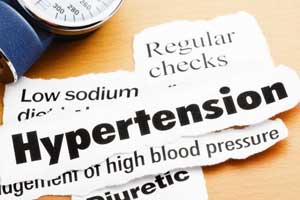- Home
- Editorial
- News
- Practice Guidelines
- Anesthesiology Guidelines
- Cancer Guidelines
- Cardiac Sciences Guidelines
- Critical Care Guidelines
- Dentistry Guidelines
- Dermatology Guidelines
- Diabetes and Endo Guidelines
- Diagnostics Guidelines
- ENT Guidelines
- Featured Practice Guidelines
- Gastroenterology Guidelines
- Geriatrics Guidelines
- Medicine Guidelines
- Nephrology Guidelines
- Neurosciences Guidelines
- Obs and Gynae Guidelines
- Ophthalmology Guidelines
- Orthopaedics Guidelines
- Paediatrics Guidelines
- Psychiatry Guidelines
- Pulmonology Guidelines
- Radiology Guidelines
- Surgery Guidelines
- Urology Guidelines
IIT Madras study links tissue-remodelling enzyme to increased Hypertension risk

Study on association of MMP7 gene with hypertension in 2 distinct Indian populations – North & South Indians - discovered strong association of a common nucleotide variation in the promoter region of the MMP7 gene with increased hypertension risk.
CHENNAI: Indian Institute of Technology Madras Researchers have found an association between a particular tissue-remodelling enzyme called ‘MMP7’ and risk of hypertension. The results of the study have been published in the reputed peer-reviewed journal Hypertension.
Hypertension, a common disease in India, is associated with remodelling of heart tissues. Matrix metalloproteinases (MMPs) play a crucial role in such hypertension-induced heart tissue remodelling, which results in alterations in the structural and mechanical support to blood vessels. This directly results in an increased risk for cardiovascular diseases.
MMPs are a group of enzymes that have been found to be associated with degradation of extracellular matrix proteins (that provide structural support to the cells), during regular tissue growth. MMPS are active during normal growth, and in events such as wound healing, tissue repair and remodelling in response to injury. While the activity of MMPs in healthy adult tissues is normally quite low, it has been found that certain illnesses such as inflammatory diseases, tumour growth, and metastasis can cause an increase in MMP activity.
The Research was undertaken by a team led by Prof. Nitish R. Mahapatra, Department of Biotechnology Bhupat and Jyoti Mehta School of Biosciences, IIT Madras. This study was carried out in collaboration with Translational Health Science and Technology, Faridabad, CSIR-Indian Institute of Chemical Biology, Kolkata, PGIMER-Chandigarh and Madras Medical Mission, Chennai. The research paper has been co-authored by Dr Lakshmi Subramanian, Ms Sakthisree Maghajothi, Mr Mrityunjay Singh, Dr Kousik Kesh, Dr Ananthamohan Kalyani, Mr Saurabh Sharma, Dr Madhu Khullar, Dr Suma M. Victor, Dr Snehasikta Swarnakar, Dr Shailendra Asthana, Dr Ajit S. Mullasari, and Prof. Nitish Mahapatra.
Speaking about the findings of this research, Prof. Nitish Mahapatra said, “This study helps us better understand the role of variations and functional regulatory changes in MMP7 gene promoter in increasing risk of cardiovascular disease among individuals. This understanding will help us embark on preventive strategies for individuals carrying the variation that could lead to hypertension and related cardiovascular complications.”
Blood levels of a particular type of MMP called ‘MMP7’ have been found to be elevated in the event of hypertension, cardiovascular diseases and other metabolic syndrome groups of ailments such as diabetes mellitus. An earlier study has shown that knocking down MMP7 can reduce hypertension in rats. Structural changes in the MMP7 gene, have been associated with coronary artery disease, acute myocardial infarction, multiple sclerosis, rheumatoid arthritis, and several cancers. However, the connection between variations in the MMP7 gene and hypertension has hitherto not been well-understood.
Dr Mahapatra’s team studied the association of an MMP7 gene promoter with hypertension in two geographically distinct Indian populations – North and South Indians. They found that a change in the regulatory region of the MMP7 gene showed a strong association with increased hypertension risk. People with these changes also had increased blood MMP7 levels and high blood pressure, which suggested that this change in the gene may contribute to cardiovascular risk. The team also dissected the cellular and molecular mechanisms behind the increased blood MMP7 levels in the carriers of this genetic variation.

Disclaimer: This site is primarily intended for healthcare professionals. Any content/information on this website does not replace the advice of medical and/or health professionals and should not be construed as medical/diagnostic advice/endorsement or prescription. Use of this site is subject to our terms of use, privacy policy, advertisement policy. © 2020 Minerva Medical Treatment Pvt Ltd